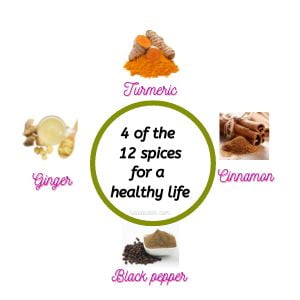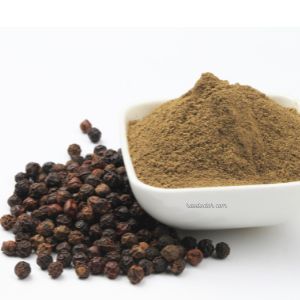Add Turmeric, Ginger, Cinnamon and Cumin to your food to “Spice up your life”

In my last article, I introduced you to 12 different spices that help us keep our guts healthy. If you have not already read it, please do it here-
Hi, I am Dr. K. P. V. Rao and in today’s article, we will discuss 4 of the 12 spices mentioned in the previous article.
While some of the health benefits of these spices can be similar, they do have some unique properties native to them. We will learn all about it today in this article.
You can also listen to this article while scrolling down at the same time-
Listen to this article-
Turmeric: Health Benefits and How to Use
When I think about turmeric, I remember the words of our Surgery HOD and Professor- Dr. Deshmane. In his first lecture to us, he asked this question- ” Do you know why we Indians have lesser gastro-intestinal problems compared to those in the West?” and he used to answer it himself by saying ” Because we use turmeric in our diet. Turmeric is the best antiseptic that nature has produced for us”. Recollecting this, I should say that he was 100% correct!
What is turmeric?

Turmeric is a yellow-orange spice that is used in curries and other dishes. Turmeric has been used in traditional Indian medicine for centuries for its potential health benefits. It contains an active ingredient- Curcumin- that has multiple health benefits (see below)
Curcumin, the active ingredient in turmeric, is a polyphenol with many potential health benefits. It has anti-inflammatory, antioxidant, and antibacterial properties and has been studied for its potential to prevent or treat some diseases.
What does Curcumin do for the body?
This active ingredient (about 2-8%) in turmeric has the following benefits-
- Anti-Inflammatory: One of the most well-known benefits of curcumin is its anti-inflammatory properties, due to its ability to inhibit the activity of certain enzymes and molecules that are associated with inflammation. It has been shown to be effective in treating inflammatory conditions like rheumatoid arthritis, osteoarthritis, ulcerative colitis, and Crohn’s disease.
- Antioxidant: Curcumin is a powerful antioxidant, meaning it can help protect cells from damage caused by free radicals. Studies have shown that it can reduce oxidative stress in the body and help protect against diseases associated with oxidative damage, such as cancer and heart disease.
- Antibacterial: Curcumin is also an antibacterial agent, meaning it can help protect against bacterial infections. It has been shown to be effective against certain strains of bacteria, including E. coli [found in our guts] and Staphylococcus aureus [found on skin].
- Cardiovascular Health: Several studies have found that curcumin may be beneficial for cardiovascular health, due to its anti-inflammatory and antioxidant properties. It has been shown to reduce total cholesterol levels and the risk of cardiovascular disease.
- Cognitive Function: Curcumin has also been studied for its potential to improve cognitive function. Studies have found that it may improve memory and reduce age-related cognitive decline.
Overall, curcumin has a wide range of health benefits and can be a powerful tool in improving overall health and wellbeing.
raodoctor.com
So, coming back to turmeric as a spice. Turmeric has been shown to prevent and lower your risk of certain diseases and conditions, including heart disease, type 2 diabetes, and inflammatory conditions.
This is largely due to the anti-inflammatory properties of turmeric. Turmeric can also help improve your digestion due to its ability to increase the flow of bile and increase the flow of digestive enzymes.
Turmeric and curcumin are under active evaluation as anti-inflammatory and antineoplastic [anti-cancer] agents, for treatment of diabetes and hyperlipidemia and as therapy of liver diseases including nonalcoholic steatohepatitis (NASH).
Source: NCBI
Turmeric can also help prevent and reduce symptoms of inflammatory conditions such as arthritis [especially osteoarthritis], joint pain, and inflammatory bowel disease.
Side effects of using too much turmeric
Turmeric is considered safe in doses of 100 to 1000 mg/day. However, doses more than this can lead to mild symptoms of dermatitis and GI upset.
Useful resource- 9 reasons for using turmeric
Cinnamon: Health Benefits and How to Use
Cinnamon is a popular spice used in many sweet and savory dishes. It is also used in beverages such as hot cocoa.

Cinnamon is a popular anti-inflammatory due to its anti-inflammatory properties, which can help prevent and lower your risk of type 2 diabetes, insulin resistance, and metabolic syndrome.
Cinnamon also has properties that help with blood flow, which can prevent and lower blood pressure. This can also reduce blood cholesterol levels and increase satiety hormones, helping you maintain a healthy diet.
Cinnamon can help you maintain a healthy heart and blood pressure due to its ability to increase blood flow and lower blood pressure.
Useful Resource- Watch this Video
When you add cinnamon to your diet, be sure to consume natural cinnamon products such as cinnamon sticks and cinnamon powder, as the chemical constituents of the spice are released when cinnamon is processed into a powder form. Useful Resource- Cinnamon in brain health
Side effects of using too much Cinnamon-
Having too much cinnamon in an excitement to get quick results can cause some serious side effects, so please be cautious while using it. Here are the common side effects of using excess cinnamon-
• Diarrhea and gastrointestinal discomfort: Consuming too much cinnamon can cause diarrhea, abdominal pain, and other gastrointestinal issues.
• Skin irritation: High amounts of cinnamon can cause skin irritations such as rashes, hives, and itching.
• Low blood sugar: Consuming too much cinnamon can lead to hypoglycemia or low blood sugar, which can cause dizziness, confusion, and even seizures in extreme cases.
• Liver irritation: Too much cinnamon can cause an increase in liver enzymes, which can lead to inflammation and other liver problems.
• Interactions with medications: Cinnamon can interact with certain medications, such as blood thinners, and can cause unwanted side effects.
Useful resource- Side effects of Excess Cinnamon
Ginger: Health Benefits and How to Use
I am pretty sure that you must be using ginger in your diet occasionally if not daily. Most of Indians do, especially in tea, popularly known as adrak chai.
Ginger is a common Asian spice that has been used for centuries in traditional Asian medicine and cooking. Ginger can be consumed as tea or used in many dishes.

Ginger is an anti-inflammatory due to its anti-inflammatory properties, which can help prevent and lower your risk of type 2 diabetes, metabolic syndrome, and certain cancers.
Ginger can help improve digestion due to its ability to increase satiety hormones, reduce cramps and nausea, and aid in healthy liver function.
Ginger can also help reduce cravings for sugary and fatty foods due to its ability to decrease blood sugar levels and increase brain-derived satiety hormones, helping you maintain a healthy diet.
Side effects of using too much Ginger
Ginger, if used in moderation such as in curries has little or no side effects, except it may cause some gastric disturbances in some people.
But using in excess for its benefits like reducing sugar and blood pressure can have a negative effect on our health. Here are the commonly known side effects of using too much ginger-
-Increased risk of digestive problems, such as diarrhea, constipation, and stomach pain.
-Increased risk of dehydration, due to excessive loss of fluids and electrolytes.
-Nausea and vomiting.
-Abdominal cramps, bloating, and gas.
-Allergic reactions, such as skin rashes and itching.
-Headaches and dizziness.
-Increased risk of developing kidney stones.
Useful resource- Ginger: Health Benefits and Risks
Black Pepper: Health Benefits and How to Use
Black pepper is a common seasoning used in many dishes and beverages. Black pepper is a popular anti-inflammatory due to its anti-inflammatory properties, which can help prevent and lower your risk of type 2 diabetes, metabolic syndrome, and certain cancers.

Black pepper can also help improve digestion due to its ability to increase the flow of bile and digestive enzymes, which can aid digestion and reduce bloating and cramps especially in women who experience these side effects.
Black pepper can also help prevent and reduce symptoms of inflammatory conditions such as arthritis, joint pain, and inflammatory bowel disease.
Black pepper can also boost your immune system and help you stay healthier due to its anti-inflammatory properties.
Side effects of using too much Black Pepper-
Any spice should not be used in excess. The same is true for Black Peppers. Here are the known side effects of using too much black pepper-
• Upset stomach: excessive consumption of black pepper can lead to stomach discomfort, cramping, and nausea.
• Skin irritation: excessive consumption of black pepper may cause skin irritation, itching, and burning.
• Diarrhea: excessive consumption of black pepper can cause loose stools and diarrhea.
• Allergic reactions: some people may have an allergic reaction to black pepper, resulting in hives, skin rash, or difficulty breathing.
• Heartburn: excessive consumption of black pepper may lead to heartburn and indigestion.
• Irregular blood pressure: excessive consumption of black pepper may decrease blood pressure, leading to dizziness, headaches, and fatigue.
• Dehydration: excessive consumption of black pepper can lead to dehydration, as it can increase urination and sweating.
• Kidney problems: excessive consumption of black pepper can lead to kidney problems such as kidney stones.
Useful Resource- Black pepper side effects
Final words
I conclude this article here. My next article will be a detailed discussion on the next 4 spices. In the meanwhile, do share this article on social media by using the icons at the bottom of this article. You can also Click to Tweet-
4 of the 12 spices for a healthy life Share on XAdios.
